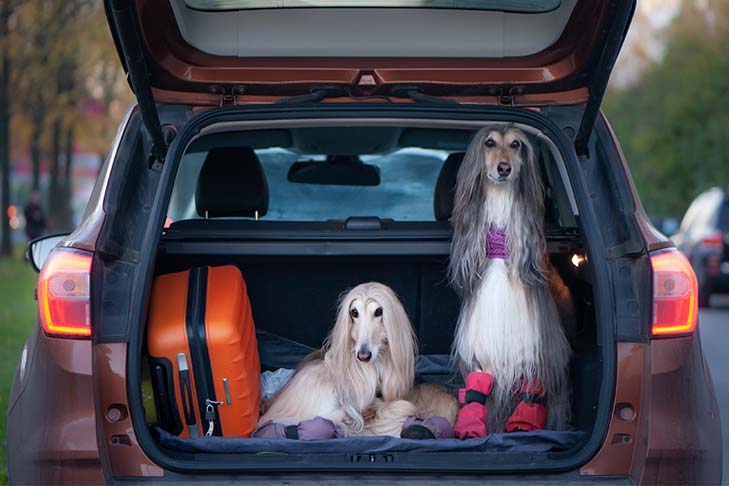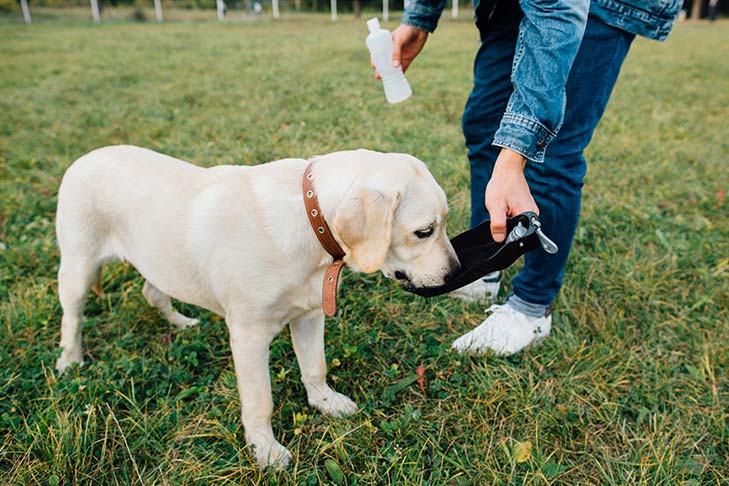AKC is a participant in affiliate advertising programs designed to provide a means for sites to earn advertising fees by advertising and linking to akc.org. If you purchase a product through this article, we may receive a portion of the sale.
Natural disasters affect everyone, including your pets. If you live in a hurricane-prone area, you will need to make certain that you protect your dog from the unique health concerns that can arise during a storm. During a hurricane, dogs are exposed to many of the same dangers as people. Being prepared will keep your pet safe both during and after the storm.
Make an Emergency Plan for Your Dog
Long before disaster strikes, your family should have an emergency plan in place. A good emergency plan includes making decisions such as where you will go in the event of an evacuation, how you will communicate with each other if you become separated, and what you will do if you are unable to return home after the storm. For your pets, your emergency plan should also include designating a caregiver – such as a trusted neighbor – who can look after your pets if you are unable to reach them during an emergency. You can also place a rescue alert sticker on your front door to notify first responders that there are pets inside your home who need to be evacuated.
Whether you decide to evacuate or stay in your home during a hurricane or other natural disaster, it is important to have an emergency kit prepared for your dog. Your kit should include all the essentials your pup will need to ride out the storm, including:

- Food and fresh water, enough for at least three days
- Food and water bowls
- First aid kit
- Pee pads, paper towels, and garbage bags for clean-up
- Medications and prescriptions
- Medical records
- Contact information for your regular veterinarian and the nearest emergency vet clinic
- Treats and toys to keep your dog busy
- Leash and collar with ID tags
- List of pet-friendly shelters and accommodations, in case you need to evacuate
Remember that if you are ordered to evacuate, you should take your pets with you. If it isn’t safe for you to stay, it isn’t safe for your pets either.

Microchip Your Dog
If you become separated from your dog during a natural disaster, a microchip is your best chance to be reunited. A microchip can easily be placed under your dog’s skin by your veterinarian, and it contains a unique ID number that is used to look up your contact information. Be sure the contact information associated with your dog’s microchip is kept up-to-date. This can typically be done on the microchip manufacturer’s website.
Your dog should also wear a collar and ID tags including your contact information. ID tags should include your dog’s name and your telephone number at the very least. If your dog has major health issues that require medication, including this information on the tag will help ensure your dog receives medical attention quickly.
Hurricane-Related Preventive Care for Your Dog
Hurricanes bring heavy rains and flooding, which can lead to an increased prevalence of illnesses such as heartworm disease and leptospirosis. Additionally, if you are unable to return home after the storm your dog may need to spend some time in a boarding kennel or shelter environment, which could mean exposure to contagious diseases such as kennel cough. Keeping vaccinations and parasite prevention medications up-to-date will ensure your dog stays healthy despite the sudden changes. Your veterinarian can advise you on the best preventive care routine for your pup based on the common illnesses in your area.
It is also important to make sure your canine companion has access to fresh food and water, both during and after the storm. Your dog’s food should be stored in watertight containers to prevent contamination. Flood waters are often contaminated with bacteria, mold, and parasites that can make your dog seriously ill, so don’t allow your dog to drink from any water source that you would not drink from yourself. If you don’t have a supply of safe food and water for your dog, rescue workers may be able to direct you to a shelter that is equipped to provide disaster relief for pets.

Evaluate Your Dog After the Natural Disaster
Once the danger has passed you’ll need to check your dog over – particularly if you were separated during the storm. Look for any signs that your dog needs medical attention, such as:
- Wounds or other injuries.
- Pain, limping, or swelling.
- Changes in energy level.
- Changes in appetite.
- Coughing, sneezing, or discharge from the nose.
- Vomiting or diarrhea.
- Changes in behavior.
Remember, it’s better to be safe than sorry. If you are at all concerned about your dog’s health following the natural disaster, it is always a good idea to make an appointment for an examination by a veterinarian. In some cases, veterinarians deploy as part of disaster-relief teams and will be on hand to provide medical care for pets affected.
Hurricanes and other natural disasters are scary for everyone, but being prepared can help keep you and your pets safe. Remember to include your dog in your family’s emergency plans, and keep your pup’s emergency kit stocked and ready to go. With careful preparation, your canine companion will be protected throughout the storm.
AKC Pet Disaster Relief Program
Storms, flooding, and wildfires across the country have been devastating for people and their pets. AKC Reunite has donated funds to support the work of shelters and rescues that are saving and reuniting pets with their owners during such disasters. But, it is after tragedies like these, the need for emergency preparedness is evident.
Each AKC Pet Disaster Relief trailer is stocked with essential supplies to house at least 65 pets during the critical first few days after a disaster is declared. The trailer has lighting and is wired for electricity to run off either a generator or a 110v power supply.
The program’s genesis was in response to the devastation after Hurricane Katrina in 2005 when many people stayed in harm’s way because emergency response plans did not accommodate pets. AKC Pet Disaster Relief’s life-saving trailers enable local Emergency Management organizations across the country to plan, prepare and respond to disasters that impact people and their pets.


